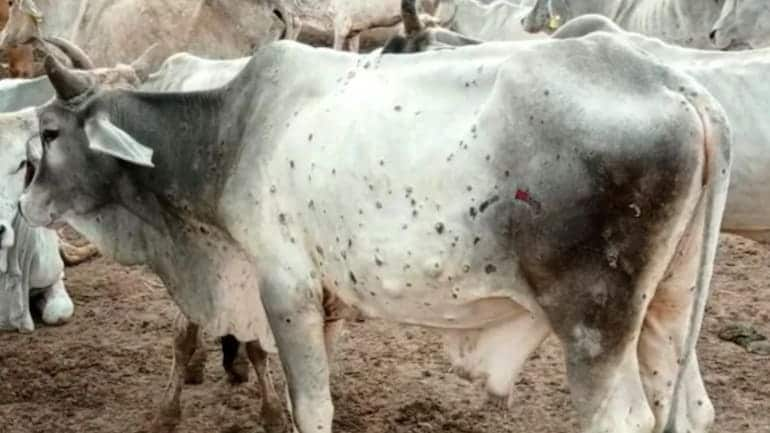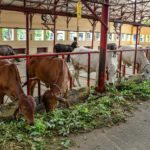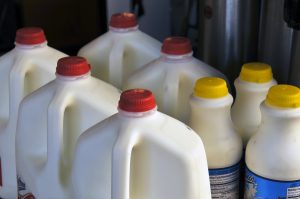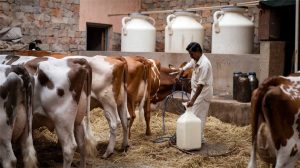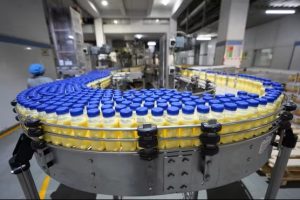
In Nagaur district of Rajasthan, five villages surrounding the region have seen more than 100 cows die in a day in each village. “One JCB machine is standing by just to dig graves for cattle who died due to Lumpy skin disease (LSD) and have been dumped all across highways and open areas. There are thousands of cows/oxen getting infected with the lumpy skin disease virus with the death rate of 40-50 per cent in reality, while other reports display numbers around 5-10 thousand and the death rate is 5-6 per cent,” said Dheeraj Gaur, a local who also owns cattle in the district.
Dheeraj has written to the Indian Council of Agricultural Research, National Research Centre on Equines ICAR-NCRE in Hisar requesting doses of the first indigenous vaccine for lumpy skin disease vaccine created by the institute in collaboration with ICAR Izatnagar, Bareilly, U.P. called ‘Lumpy Pro Vac’ for his village. For now, the only vaccine available for LSD is the one used against Goat pox and sheep pox virus, which is only about 70% effective in providing protection from the disease. In most cases, it has been found to be ineffective.
But it may be too late for the infected cattle. The new LSD vaccine is only being given to healthy cattle that have not yet been infected with LSD in organised farms.
In the past two months, at least 7,300 cattle have died in the states – 3,359 died in Punjab, 2,111 in Rajasthan, 1,679 in Gujarat, 62 in Jammu and Kashmir, 38 in Himachal Pradesh, 36 in Uttarakhand and 29 in Andaman Nicobar. LSD is also being reported in Haryana. But the unofficial count is much higher as stray cattle is unaccounted for.
IMPACT ON MILK YIELD LIKELY IN COMING MONTHS
The impending fear among dairy farmers is that if these animals are not vaccinated in mass before the end of the monsoon season, there could be a severe impact on milk production and distribution, with small dairy farmers being the most impacted.
Gujarat has started to see a fall of milk yield of around 50,000 litres per day due to the outbreak of LSD. “This accounts for a mere 0.25 per cent of the daily procurement of 20 million litres, and will not have much impact,” said R S Sodhi, Managing Director, GCMMF, AMUL in Anand, Gujarat.
In Punjab, which has also been one of the states severely affected by cattle fatalities, milk production in the state has dropped by 15-20 per cent, officials say. In Punjab, the milk production is 3 crore litres per day, but only 1.25 crore litres is used for commercial purposes like milk processing or sent to companies for milk products; the rest is consumed.
Progressive dairy farmer association (PDFA) president Daljit Singh Sadarpura said, “Dairy farmers are suffering as there is a fall in milk production by almost 20-45 per cent.. The figures being given officially in Punjab are incorrect. At least 1 lakh animals have died in one district. At least 15,000 animals are dead and are floating in rivers.”
Another big challenge is going to be adulteration in milk. The food and drug administration (FDA) has started collecting milk samples fearing adulteration in milk and milk production. “Due to low yield of milk, adulteration could happen. It is going to be a problem if adulteration is not controlled,” Sadarpura said.
An agitation of 20,000 dairy farmers is being led in Ludhiana in front of the Very Milk Plant,
“We are asking for milk rates that were promised, even the Rs 2 per litre is not reaching the farmers. We also demand Rs 1 lakh compensation for dead cows due to LSD,” he added.
DEATH AND ABORTION IN PREGNANT COWS, STERILISATION IN BULLS
Production will remain affected and could remain reduced for sometime as the affected animals will not reproduce either. Since the symptoms are so debilitating, there is a direct impact on milk production in the cattle. “LSD symptoms are high fever and development of skin nodules, which leads to weakness, and therefore, the cows undergo drastic reduction in the milk yield, pregnant cows are being aborted and bulls become sterile. Some of the farms we have been talking to about milk production have dropped by 50 per cent,” said Dr Naveen Kumar, Principal Scientist, ICAR, NCRE institute in Hisar. “They may not been able to recover to their full capacity,” he said.
“Symptoms are being seen in buffaloes also, although mild, they are off-feed for five days. In cows, there is high fever for 4-5 days. Infection in the ulcers, all treatment is symptomatic and now there is no specific treatment for the vaccine,” said Dr Munjal.
“Recovery in the cattle takes at least 15-20 days. We don’t even know if they will be able to recover to these milking levels again. Dairy farmers are already under stress and bhoosa/chaara (fodder) and grain prices have gone up. Many dairies are shutting down due to increased costs. Farmers whose animals have died are under stress. The government should help them procure new animals because they are losing their livelihood as well,” said Dr Munjal.
LSD IN BUFFALOES, BULLS; VACCINATION IN FULL SWING
Recent instances show that the infection is now spreading in buffaloes, oxen, who were earlier expected to be resistant to this disease, and even bulls, and a few cases of horses and camels being infected have been reported, government officials said.
At the Hisar Bovine Sperm Centre, in Haryana’s Hisar, farm owners have vaccinated 46 bulls, fearing spread of disease. “I didn’t know about the side effects of the vaccine, so I have only injected 46 bulls on 13 August. Till now, there have been no side effects and there is no problem in bull semen quality also. I will go for testing of antibody titre also after one month of the vaccination.” said Dr V K Munjal, technical head at the facility.
The bull farm has many exotic breeds, like Holstein Friesian (H.F) and Jersey. Sperm from these is used for artificial insemination to improve genetic stock by cross-breeding with high-milk yielding indigenous cattle. Some even say indigenous breeds are more resistant to LSD.
Ramesh Jindal, farm owner, Hisar Bovine Sperm centre said, “The goat pox vaccine is still not stopping the disease and we feel the new LSD vaccine is more effective. LSD in animals, is just like corona in humans. If an animal doesn’t eat, then it won’t produce milk, and ultimately will die. We don’t know how much this disease is affecting, as in some cases it is causing death also. It’s not just cows, but even buffaloes are getting infected.”
MILK YIELD IN INDIA: CAN PRICES BE HIKED FURTHER?
The latest CRISIL assessment on milk production and price hike also points out the impact of LSD, but says the milk price increase by Rs 2 will limit the drop in profitability of organised dairies. A statement by Anand Kulkarni, Director, CRISIL Ratings said, “Milk procurement prices have shot up 8-10% in the past six months because of lower-than-expected milk collection — on account of cattle diseases in some of the major milk-producing states — and high prices of cattle feed.
Additionally, the surge in crude price has translated into a significant increase in transport and packaging costs. This has necessitated a second price hike in the past six months. We don’t anticipate any more price hikes as an expected improvement in milk collection and softening input prices will support profitability in the second half of the fiscal year.”
As per data, an indigenous breed is considered low yielding and gives 2.71 kg of milk a day, while an exotic cow gives 9.15 kg of milk. But cross-bred animals give about 10-15 litres a day, with a Jersey or Holstein Friesian which gives a milk yield of at least 30 litres a day. The flush season (refers to the peak period of raw milk supply, which is generally from December to mid-March every year). (source: Department of animal husbandry and dairying)
On average, milk production, along with the quantum of increase for the country during the last six years, has been about more than 6 per cent till 2018-19, and was slightly impacted during the Covid pandemic. India’s yield in 2019-2020 was 198.4 million tonnes, which is 5.69 per cent and was estimated to be at 210.0 million tonnes (5.81% in 2020-21, according to provisional data tabled in the Lok Sabha in February 2022.
But an average growth rate of milk yield has also declined in states like Uttar Pradesh, which is the highest milk-producing state in India, from 4.41% in 2019-2020 to a -1.58% in 2020-21, in Gujarat it fell from 5.52% in 2019-20 to 3.66 per cent in 2020-21, in Punjab from 5.94 per cent to a mere 0.35 per cent and in Haryana from 9.40 per cent to -3.84 per cent. In fact, Rajasthan was the only state where milk yield growth rate was projected to be higher from 8.05 per cent in 2019-20 to 20.14 per cent in 2020-21.
LSD VACCINE: TIMELY AVAILABILITY IS KEY
Officials across states where the disease spread is large are scrambling to vaccinate the cattle to avoid a fall in milk production.
“We have also expressed an Emergency use authorisation for the vaccine. 2296 cattle have been administered the vaccine in various farms. it has been found to be safe in lactating, pregnant and milching cattle, as well as being given to bulls in some farms. States like Gujarat, Punjab and Rajasthan are demanding more vaccines because the death burden is high – 10-15% is the fatality rate in this disease,” said DR BN Tripathi, Deputy DG, Animal Sciences, ICAR.
“We have already given 12,000 doses to organised farms and gaushalas in various states till now. As soon as we scale up production, we have 4 lakh doses and more are in production,” said Dr Kumar. We have written to Agri Innovate, under the ministry of agriculture, we will expedite the process once we get approval from the animal husbandry department,” he said.
But according to official estimates, India has a cattle population of almost 23 crore, including cows and buffaloes, with a total of 53 crore domesticated animals such as sheep, goats, camels, horses, bulls, oxen, etc.
“We have close to more than 20 crore cattle population in India and a total of 53 crore population of feeding and domesticated animals in India. Providing an animal vaccine at this level will not be possible without production capabilities of private companies. A meeting of interest will be held soon in Delhi,” said Dr Tripathi. Official sources also said that the agriculture ministry is in talks with a few companies for a commercial tie-up.
As for how long will the protection last in cattle, scientists say cattle can be protected for at least a year, but immunity starts building only after a month of the vaccination, the disease of LSD can still infect within that period. “A live attenuated vaccine created by isolating the LSD virus can provide protection for up to 1-2 years, but we have to wait for the data, we are expecting these vaccines to provide immunity for at least a year.” said Dr Naveen.
For now, the vaccine made by the government is a hope that can help save a large cattle population from the dreaded lumpy skin disease if given before the end of the monsoon season in India and before the beginning of the milk collection period from December. Until the government is able to move to mass production of the LSD vaccine, the coming months could see a massive fall in milk availability both for consumption and commercial use in India, with dairy farmers suffering the consequences of the disease in cattle.
